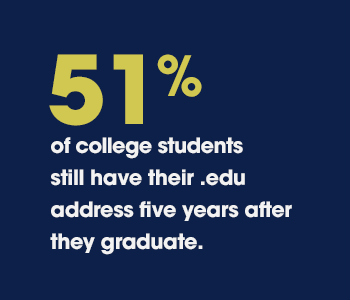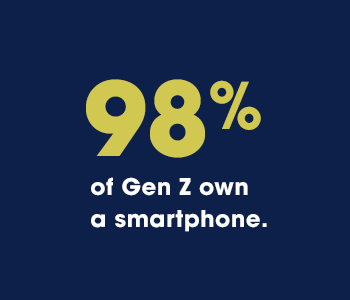You want to engage Gen Z, so you’ve decided to create an exclusive offer for college students. And you want to share it with a global audience, since there are two billion Gen Zers worldwide. Next, all you need to do is to promote it across all your channels, right?
Not quite. You’ll want to confirm everyone who redeems your offer is actually a student, and that’s where things get tricky. There are many obstacles to global student verification, obstacles that can seriously derail your program. Knowing what they are will help you protect your offer when you launch your program and maintain its success as you scale.
01 .edu Verification Has Severe Flaws
If you’re relying solely on an .edu address for student verification, you may be getting ripped off. While brands have used this tactic for years, it’s fraught with issues.
The first is that people hold onto their .edu email addresses long after they’re students.
- 68% of college students use their .edu email address for a year following graduation.
- 51% still have the .edu address after more than five years.
- Some colleges encourage alumni to keep this address for the rest of their lives.
Many shoppers take advantage of this. One in five adults admits to having used an .edu email address to redeem a gated student offer even when they were no longer a student. It’s no wonder that discount fraud can be as high as 35% for brands! This kind of offer abuse erodes your margins—and your offer’s integrity.
.edu verification also limits your reach. Since 34% of students don’t have an .edu address, more than one in three consumers eligible for your offer are unable to access it. Don’t leave that money on the table.


02 Legitimate Student Enrollment Is Difficult to Confirm
Starting with a US-centric student offer is great, but making your offer available in other countries is even better. As Jake Weatherly, SheerID’s CEO, said, students are a truly global segment, “universally understood, valued, and revered.”
The problem is that the logistics of student verification vary widely from country to country. How do you confirm enrollment is current? What document types are acceptable in each country? Is the educational institution even valid?
All these are highly important considerations to address if you want to cost effectively scale your student offer. Unfortunately, most brands don’t have the expertise, time, or resources to address them in-house.
03 Manual Verification is More Challenging Than It Appears
You may think that since you’re starting small, you can keep up with manual verification; but don’t underestimate the power of your program. We consistently see gated student offers grow like wildfire. One of our customers launched their offer in June and by September they had 22,000 student verifications—far surpassing their expectations.
As your student program grows, so will your need for student verification resources. If you’re using an internal or third-party team to manually verify documents, student verification can easily become time-consuming, which can negatively impact campaign performance. If your customers have to wait for hours or days to be verified, your conversion rate will take a big hit.
Manual verification can also be cost-prohibitive. You need to hire staff to process the requests, make sure they understand what constitutes proper documentation, and continuously retrain them as those requirements evolve.
Language barriers can present additional challenges, too. Manual student verification can quickly break down when you’re dealing with a multitude of documents that aren’t in English.
04 Optimizing for Global UX Is Hard
Engaging the world’s students means reaching them on mobile. Ninety-six percent of Gen Zers in North America own a smartphone, and that number is even higher in other regions in the world. In fact, in the Middle East and Africa, it’s 99%.
Creating a mobile-first student verification experience is a must, particularly in the developing world. But having to optimize and localize the mobile user experience in each targeted country can be an overwhelming burden on any marketing team.


05 Cart Abandonment Is a Global Issue
You know the deal: every click on the path to conversion is precious, especially when it comes to younger consumers who demand instant gratification. Yet, even with a seamless verification process, you’ll have customers who won’t complete the purchase.
Effectively handling cart abandonment is critical to gaining a competitive advantage with Gen Z. These consumers want a brand relationship, not just a transaction; email can be a poor re-engagement channel, particularly with students who live on their mobile devices. Texting is more popular, but adds complexity. It’s worth it though: one of our customers that re-engaged students with SMS instead of email saw a 50% lift in conversions.
06 Fraud Has No Boundaries
Brands need to mitigate the risk of rolling out programs in some of the world’s most renowned hotspots for fraud. The global marketplace has many perils that can undermine your student offers, including:
- Falsified documents
- Identity spoofing
- Automated attempts to claim offers
- Other subtle patterns of abuse
When fraudsters share these exploits on social media they can go viral, further compounding the risks to your brand.
And you won’t just lose money. According to our consumer survey , 80% of shoppers who know a brand allowed an exclusive offer to be wrongfully redeemed would lose trust in that brand, and half would shop there less often.
Are You Facing These Challenges… or Worried You Might?
Exclusive student offers are a terrific way to capture Gen Z, but only if you have a student verification system that can protect your promotions in every country. Digital verification provides this security, but you need to choose the right solution.
Stay tuned for our upcoming blog with a checklist to help you choose the right student verification platform. Or Contact Us now for a free consultation on how SheerID’s Digital Verification Platform can make worldwide student verification easy.








